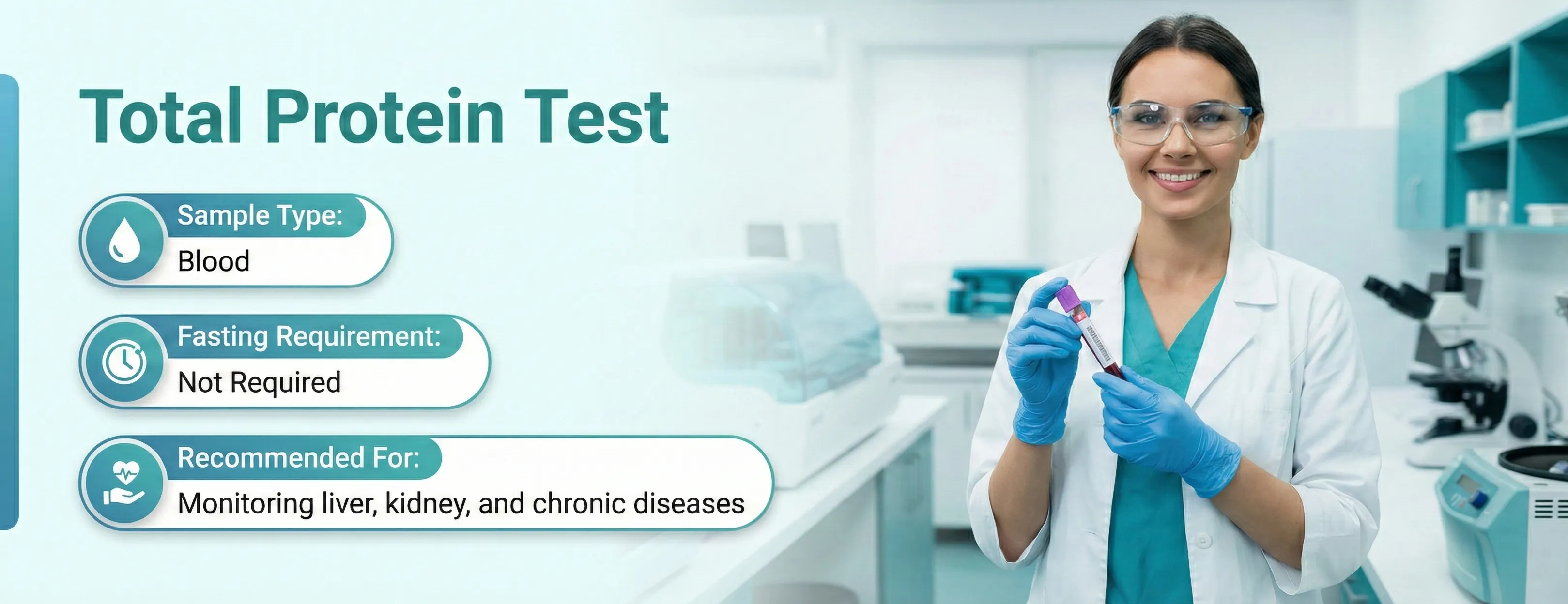785+ orders placed in your location
100% NABL & ISO Certified Lab • 100% Accurate Reports
Total Protein Test
Total Protein Test, Serum Protein Test, A/G Ratio Test, Albumin to Globulin Ratio Test
- SummaryThe Total Protein test measures the overall amount of albumin and globulin in the blood, helping assess liver function, kidney health, and nutritional status. It is performed using a blood sample, and fasting is not required, though some doctors may advise it for specific evaluations.Read more
- Reports Within10 HrsView Sample Report100% NABL & ISO Certified Labs
- SampleBlood
- AgeAll Age Group
- GenderMale and Female
- FastingNot Required
PharmEasy Promises
Know More About The Test
A quick info on Total Proteins Test
Overview
The total protein test is used to diagnose, screen and monitor the condition of people showing abnormal levels of proteins in their bodies.
The primary misconception of blood, plasma and serum is that they are similar to each other. The whole blood contains formed elements and plasma proteins. Formed elements are red blood cells, white blood cells and platelets. Thus, the 'whole blood' minus formed elements is the plasma proteins or the base for our blood. Plasma fosters clots with the clotting proteins, namely fibrinogen.
Types of plasma proteins can be depicted as follows:
- Albumin: Accounts for 80% authority for controlling the body's osmotic pressure to prevent fluid from leaking.
- Globulin: Plays a vital role in maintaining the body's immune system.
These proteins have various functions:
- Maintains viscosity and osmotic pressure
- Ensures acid-base balance
- Promotes blood clotting.
- Plays a crucial role in defence mechanism
- Transports nutrients and respiratory gases
- Removes waste products from the body to the kidney
Any abnormality or deviation of protein from their normal ranges can be reflected using a protein test. The total protein test also measures the total protein levels (as a summation of albumin and globulin) as well as individual levels. Further, by means of protein tests, one can also measure the values of several types of globulin in the blood.
Abnormality in the protein levels is the primary cause behind India facing malnutrition at a higher rate. Some contributory risk factors behind protein malnutrition are:
- Lack of food, poverty and poor hygiene
- Large family sizes
- Poor mother health
- Breastfeeding for less than five months
With the Mid-Day Meal Scheme (MDM) and Integrated Child Development Services (ICDS), the Government of India aims to provide a safety net for youth, adolescent girls and pregnant women, especially as they are at a higher level risk of developing malnutrition.
According to the Indian Council of Medical Research (ICMR), an average Indian adult needs to consume 1 gram of protein per kilogram of their body weight per day. For example, if a person weighs 50 kg, they must consume at least 50 grams of protein per day to meet the body's requirement. In the practical world, nearly 73% of Indians have a protein deficiency and above 90% are unaware of the recommended daily intake.
Risk Assessment
Severe dehydration, Malnutrition, Kidney disease, Liver disease
What does this test detect?
The total protein test detects total plasma protein, albumin and globulin levels in the blood. The protein test results are based on the blood sample collected from the patient's arm. It can help diagnose the following:
- Severe dehydration
- Malnutrition
- Kidney Disease
- Liver Disease
- Blood diseases
- Malabsorption syndromes
Indications for Total Protein Test
- To detect the cause behind swelling of ankles and abdomen.
- To determine your susceptibility to infection.
- To diagnose any blood diseases, like leukaemia.
- If you are facing symptoms like nausea, vomiting, jaundice, fluid build-ups, abdominal pains.
- To high-risk group individuals, like adolescent girls, pregnant women, infants, preschool children, lactating mothers and elderly.
How frequently should you take this test?
A total protein test is commonly a part of a comprehensive liver function test that is advised to be given at least once annually. Otherwise, your doctor will only prescribe a protein test if they suspect concerning signs and symptoms of kidney dysfunction, liver abnormalities or immediate weight loss, etc.
Test Preparation
Before the test
No specific preparation, like fasting, is needed before the total protein test. Let your doctor know about the over the counter medicines, prescription-based drugs and herbal supplements.
During the test
A nurse or sample collector will use your arm's vein to collect the blood sample. Preferably, wear a short sleeve for convenience during sample collection.
After the test
When done hygienically and according to protocol, the total protein test procedure poses no serious threats to an individual. There might be slight soreness due to needle insertion and lightheadedness.
Parameters
A total protein test includes a total of four parameters:
- Measurement of Total Protein in blood: The protein test measures the summation of all proteins. It indicates hyperproteinemia or hypoproteinemia.
- Measurement of Albumin in blood: Albumin is the protein that keeps fluid (blood) from escaping the blood vessels and accumulating outside. It is an important parameter to determine the cause of oedema. It indicated hypoalbuminemia or hyperalbuminemia.
- Measurement of Globulin in blood: Globulin protein is linked with the immunological function of the body. It indicates hyperglobulinemia or hypoalbuminemia.
- Albumin/Globulin Ratio in blood: It is essential to determine whether the patient has liver or kidney diseases.
Ranges
Total serum protein normal ranges can vary with age.
In adults and the elderly population
Type of Protein | Conventional Unit in g/dL | SI Unit in g/L |
Total protein | 6.4-8.3 g/dL | 64-83 g/L |
Albumin | 3.5-5.0 g/dL | 35-50 g/L |
Globulin | 2.3-3.4 g/dL | 23-34 g/L |
Reference: Pagana KD, Pagana TJ, Pagana TN. Mosby’s Diagnostic & Laboratory Test Reference. 14th ed. St. Louis, Mo: Elsevier; 2019.
In children population
Total Protein
Age | Conventional Unit in g/dL | SI Unit in g/L |
Premature infant | 4.2-7.6 g/dL | 42-76 g/L |
Newborn | 4.6-7.4 g/dL | 46-74 g/L |
Infant | 6-6.7 g/dL | 6-67 g/L |
Child | 6.2-8.0 g/dL | 62-80 g/L |
Albumin
Age | Conventional Unit in g/dL | SI Unit in g/L |
Premature infant | 3.0-4.2 g/dL | 30-42 g/L |
Newborn | 3.5-5.4 g/dL | 35-54 g/L |
Infant | 4.4-5.4 g/dL | 44-54 g/L |
Child | 4.0-5.9 g/dL | 40-59 g/L |
Reference: Pagana KD, Pagana TJ, Pagana TN. Mosby’s Diagnostic & Laboratory Test Reference. 14th ed. St. Louis, Mo: Elsevier; 2019.
The normal values and reference ranges of the test may vary from lab to lab. Please refer to the ranges mentioned in the report and consult a doctor to understand the interpretation of lab reports.
Test Result Interpretation
The results of the total protein test can yield information about abnormal levels of total protein, albumin and globulin. They are as follows:
Type of protein | Increased Levels | Decreased Levels |
Total protein |
|
|
Albumin | Severe dehydration |
|
Your test interpretation can vary depending on age, gender, body status, history and family inheritance. You must discuss your total protein test results with your doctor before jumping to any conclusion.
Risks and Limitations
The total protein test is a commonly done blood test with rare risks of complications. See your doctor if you notice:
- Persistent bleeding at the site of needle-insertion.
- The skin where the needle went in becomes red, swollen, or hurts.
Limitations of the test
- The accuracy of the test could be affected due to equipment or human mistakes.
- Misinterpretation of the markers leading to inaccurate report.
Was This Test Information Helpful?
Please rate your experience
References
Health packages containing 'Total Protein Test '
People Also Ask
What diseases are tested for proteins?
How do you test for protein in blood?
What happens if your protein is high?
What disease is caused by too much protein?
How much protein should I eat a day?
Have any doubts? Ask us.
Ask us anything about the Total Protein Test to understand it better
We provide trusted, expert-curated health content to support better awareness,prevention, and care.
Backed by experienced doctors, medical experts, and strict editorial standards.


